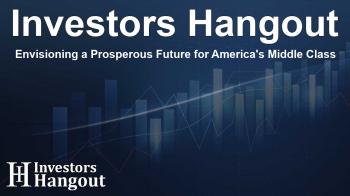Envisioning a Prosperous Future for America's Middle Class

Reimagining America's Middle Class Wealth
Grant Cardone, a motivational speaker and entrepreneur, asserts that "America should have the wealthiest middle class in the world, bar none!" This ambitious statement ignites discussions about the middle class's evolving situation in the United States. Is it feasible for the U.S. middle class to establish a new global wealth standard?
The Decline of the Middle Class
For the past fifty years, the U.S. middle class has experienced a steady decline. Recent statistics reveal that the proportion of adults living in middle-class households has plummeted from 61% in 1971 to just 50% in 2021. This trend reflects a broader issue of rising income inequality as the share of ultra-wealthy and low-income households expands.
While household incomes have improved since the 1970s, middle-class earnings have lagged behind those of the upper-class. For instance, from 1970 to 2020, median income for middle-class families rose by only 50%, compared to 69% for upper-income households. This trend highlights the concentration of wealth among the richest individuals, deepening the economic divide.
Understanding the Middle Class
Middle-class status extends beyond mere income; it encompasses financial stability and security. A recent survey suggests that many Americans perceive middle class living as having steady employment, adequate savings, and the ability to cover emergencies without falling into debt. Currently, about one-third of Americans can claim these qualities, suggesting that true middle-class living is indeed a challenge for many.
Historically, the middle class has been the backbone of the U.S. economy. In 1970, middle-class households accounted for 62% of national income, a figure that has drastically decreased to 42% by 2020. In contrast, upper-income households have seen their share double, skyrocketing from 29% to 50% in the same period.
Rising Stars in Income Distribution
Some demographic groups have seen advancement in their economic standings over the last half-century. For instance, older adults aged 65 and above have doubled their representation in the upper-income bracket from 7% in 1971 to 16% in 2021. Contributing factors include Social Security benefits, enhanced education, and increased participation in the workforce. Moreover, the middle-class share among Black adults has remained steady at 47%, while other racial demographics show declining figures.
Realizing Cardone's Vision for the Middle Class
Cardone's proposal for a thriving middle class is crucial for America’s economic future. Achieving this goal demands robust policy reforms aimed at reducing income inequality, expanding access to quality education, and promoting initiatives that enhance financial security for families. The U.S. middle class, once a global model, can reclaim its position with focused efforts and innovative solutions.
Ultimately, Cardone's vision serves as a call to action, urging us to envision a future where middle-class prosperity is not just a goal but a reality – one that builds a more equitable society and fuels economic growth across the nation.
Frequently Asked Questions
What is Grant Cardone's stance on the middle class?
Grant Cardone believes that America should have the wealthiest middle class in the world and aims to inspire discussions about achieving this goal.
How has the middle class changed over the years?
The middle class has steadily shrunk over the last five decades, from 61% of households in 1971 to 50% in 2021, indicating a widening economic gap.
What factors contribute to being considered middle class?
Being middle class involves financial stability, having a steady income, the ability to save, and being equipped to manage emergencies without incurring debt.
Which demographic groups are improving their economic status?
Older adults and married couples have seen increased representation in upper-income brackets, reflecting benefits from social programs and dual incomes.
Can America achieve the wealthiest middle class in the world?
With significant policy changes focusing on education and income equality, America has the potential to realize this ambitious goal.
About Investors Hangout
Investors Hangout is a leading online stock forum for financial discussion and learning, offering a wide range of free tools and resources. It draws in traders of all levels, who exchange market knowledge, investigate trading tactics, and keep an eye on industry developments in real time. Featuring financial articles, stock message boards, quotes, charts, company profiles, and live news updates. Through cooperative learning and a wealth of informational resources, it helps users from novices creating their first portfolios to experts honing their techniques. Join Investors Hangout today: https://investorshangout.com/
Disclaimer: The content of this article is solely for general informational purposes only; it does not represent legal, financial, or investment advice. Investors Hangout does not offer financial advice; the author is not a licensed financial advisor. Consult a qualified advisor before making any financial or investment decisions based on this article. The author's interpretation of publicly available data shapes the opinions presented here; as a result, they should not be taken as advice to purchase, sell, or hold any securities mentioned or any other investments. The author does not guarantee the accuracy, completeness, or timeliness of any material, providing it "as is." Information and market conditions may change; past performance is not indicative of future outcomes. If any of the material offered here is inaccurate, please contact us for corrections.
